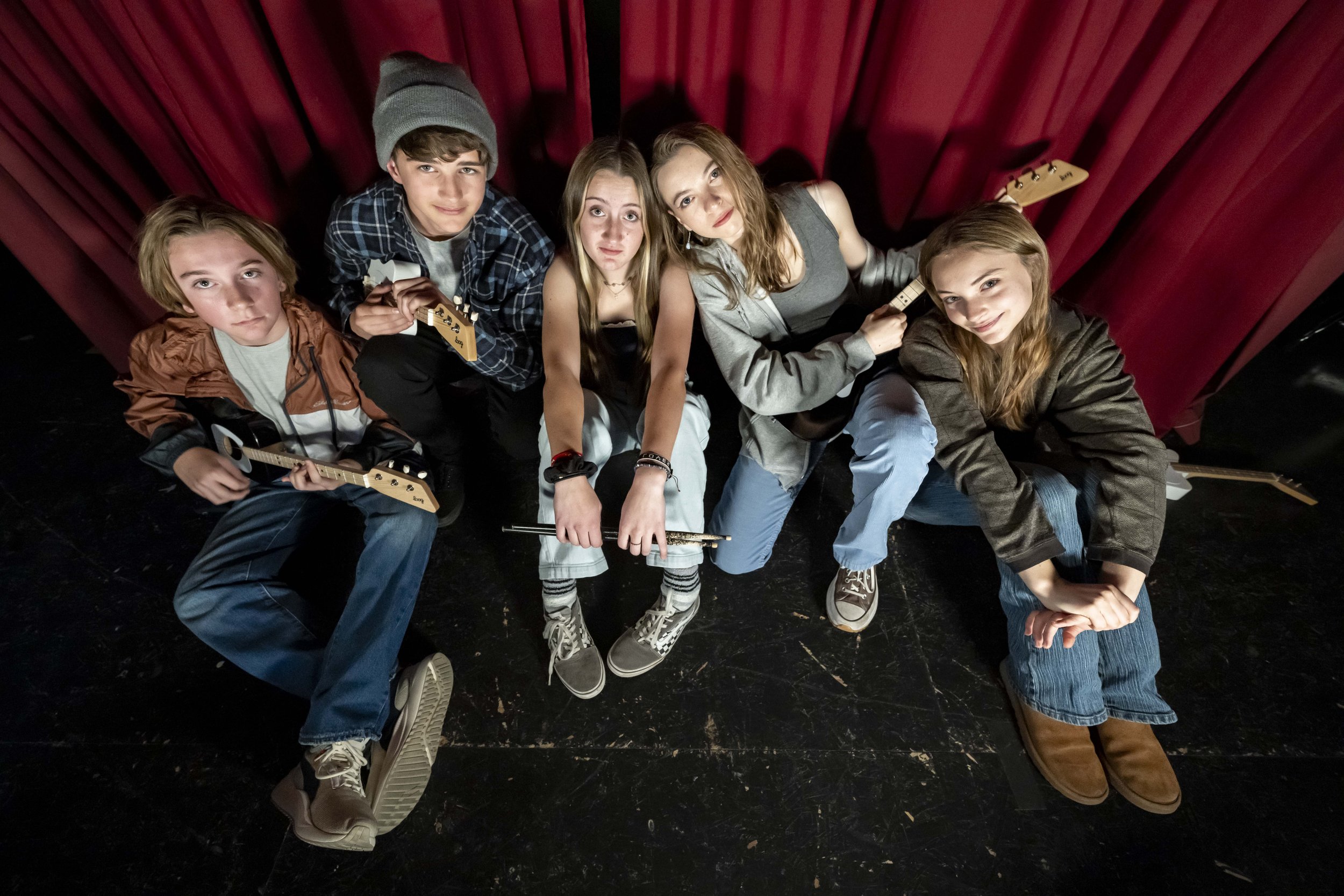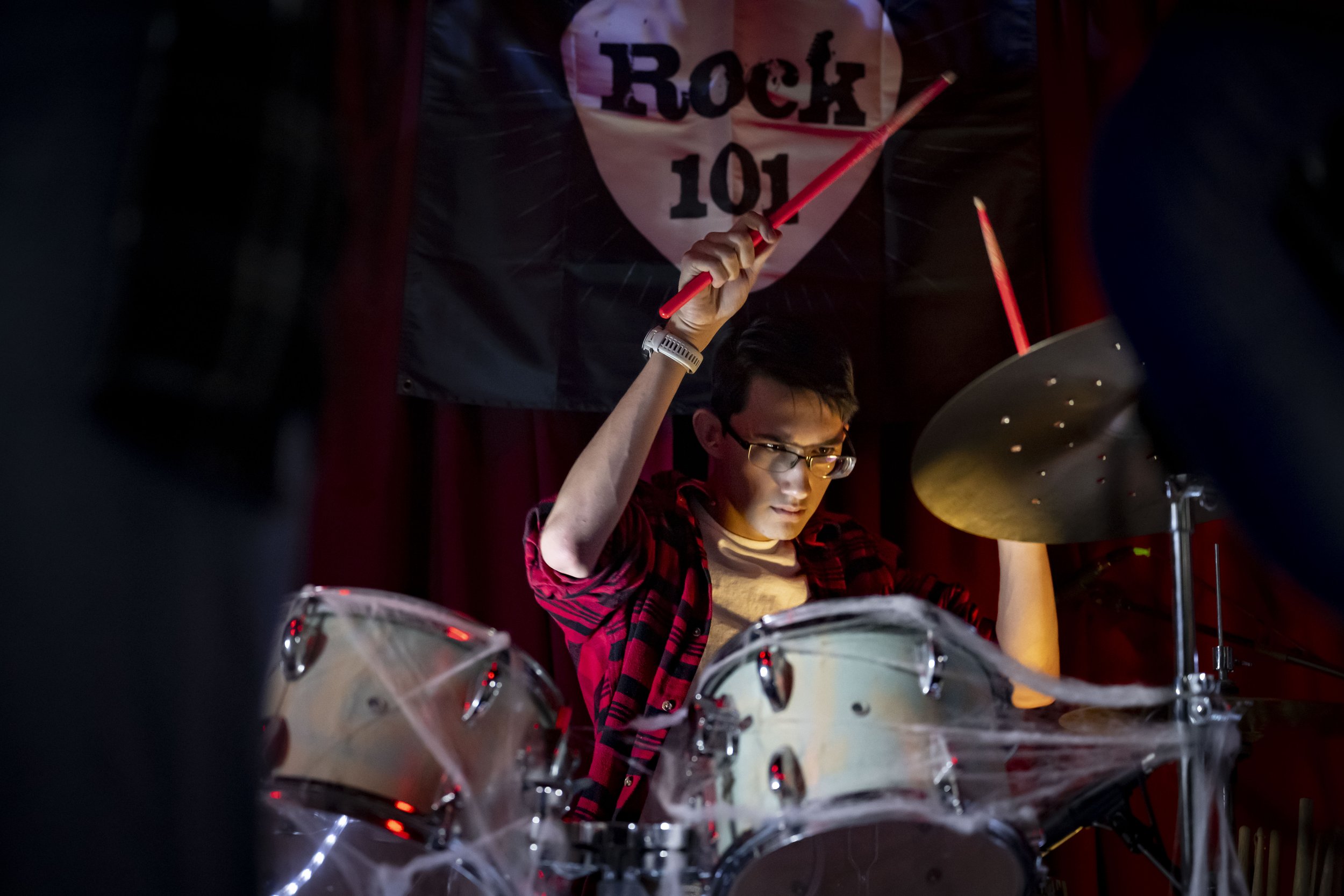Smells Like Teen Spirit: The Neuroscience of Band League
I am sitting in the audience at the Fall 2023 Band League performance. Even though I have been a Band League Groupie since it first started (kind of a brag) and I know what is coming, I still get swept up in the energy. A bunch of teenagers have been working their backsides off for the past several months. They have chosen to do this. They put in hours of practice time. Though they may be nervous when they enter the stage, they will inevitably leave the stage feeling proud, confident, and full of life.
Why can’t they feel this dedication and overwhelming enthusiasm whilst emptying the dishwasher?
There is a very real answer to that question and it’s one I am here to share with you. Remember in The Sixth Sense when Cole turns to Malcolm Crowe (Bruce Willis) and dramatically whispers, “I see dead people”? We have reached the part of this blog where I turn my head in slow motion, make eerie eye contact with you, and whisper, “I see neuroscience.”
Well, to be specific, adolescent neuroscience. A required component of my secondary Montessori credential was training in adolescent neuroscience. It is fascinating! It opened my eyes to how adolescents think and why they act as they do. It changed the way I teach as well as how I parent. The thing is, once you know it, once you see it, you can’t unsee it. I can see where schools and other institutions are coming up short. I see the missed opportunities. On the other hand, I celebrate when I observe programs nailing it.
Band League is a celebration of many things, but for me it highlights what can happen when adolescent neuroscience is applied correctly. Let’s break it down:
First, An Overview
For those who don’t get overly excited by reading books and scholarly papers about adolescent neuroscience, let me give you the short summary. Kind of short. As short as I can make it in light of my enthusiasm.
Between the ages of 12-25 (approximately) human beings go through a stage of intense brain reorganization that has been termed adolescence. Up until this point, the brain has been accumulating as much knowledge as it can as quickly as it can. (Hence, none of us are smarter than a 5th grader.) Once adolescence starts, the brain shifts. It no longer wants to accumulate knowledge; rather, it wants to become efficient. The adolescent brain goes through a process called pruning during which neurons that are not being used are removed. Remember those tap dance lessons you took in 2nd grade? If you haven’t tapped your way through the hallways since then, those neurons will go away. If your teen sometimes acts oddly and seems to forget how to do basic skills, it’s not actually their fault (I hate to inform you). Blame it on the pruning.
In evolutionary terms, this is the age when our caveman ancestors left the family to strike out on their own. While this is no longer the case, the brain is still wired in this way. Adolescents are not as interested in spending time with their family. They prefer interacting with their peer group and meeting new people. They start to seriously think about and look for their place in this world.
All of this is happening during adolescence while different areas of the brain mature BUT the individual parts of the brain mature at different rates. The limbic system matures quickly. This is the area that allows you to feel emotions. In case you haven’t noticed, adolescents can feel a HUGE range of emotions, and they feel them in a BIG way. The prefrontal cortex, which controls critical thinking and decision-making, is slow to mature. This means that adolescents are feeling large swings of emotion but they do not have the capacity to think about those emotions or to make smart decisions about how to react to those emotions. Sounds like a recipe for disaster, right? Well, maybe not disaster but definitely drama.
As you can see, there is a lot going on! Armed with this knowledge, let’s dive into how Band League enhances all of this weird adolescent brainy-ness.
I’ve Got You, Babe: Peer Interaction
As adolescents venture away from the family unit, their number one job is to navigate the social world. The most successful model for adolescent learning involves peer interaction. Band League has got this covered. By grouping students into bands, they ensure that they interact with their peers for the duration of each practice. They learn how to behave around others, how to offer and receive feedback, and how to help others. Just a heads up: this does not always look like a smooth process. Sometimes, they find themselves at odds with their peers. This is ok! Every aspect of peer interaction strengthens their view of themselves in the world.
Check Yes or No: Choice
Anyone who has adolescents at home can attest to the fact that providing them with a list of chores does not guarantee that those chores will get done. Even if they are super duper easy chores. As adolescents start to crave independence, they want to have control over their actions and decisions. One of the best ways to provide them with this is to give them choices. For example, a quick fix to the chores dilemma is to provide a list of chores and ask them to complete three of them, being clear about the deadline and consequences. (Go ahead. Try it!)
Band League incorporates choice in many ways. Individuals get to request to work with other students/bands. Bands get to choose what songs they work on. As an extension, they get to choose their name, their logo, how to present themselves to the audience, and in what style of music to perform. They are, in essence, playing around with who they are and how to express themselves in this world.
I’ve Got a Feeling: Self-Awareness & Affective Learning
Lots of emotions. So happy they can’t stop giggling and then five minutes later screaming in righteous anger at a sibling. It’s hard to keep up. Adults can help adolescents navigate this tricky emotional time by guiding them to become self-aware and to think about the emotions they are feeling.
During Band League, I have watched instructors take the time to ask how students are feeling; to inquire what needs to be done to “fix” an emotional situation; to sit with students and let them talk about and work through challenging emotions. All of this support is engaging the prefrontal cortex and creating neural pathways that can be strengthened as that area of the brain matures.
I Think Therefore I Teen: Critical Thinking
As we have seen, adolescents’ prefrontal cortex really struggles to keep up most of the time. This area can be strengthened by engaging students in critical thinking and executive functioning activities, such as: 1) how to plan a show 2) what steps need to be taken so that the entire band is on the same page and ready to go 3) what are the short term and long term goals for the semester so that we are ready for each show 4) how to problem solve as issues arise. In other words, Band League is a prefrontal cortex party.
Throw Out the Box: Creativity
Adolescents’ superpower is creativity. We will never be as creative as we are during adolescence. Adolescents experience larger dopamine hits for seeking novel (i.e. creative) situations. In addition, the part of the brain that inhibits unconventional thoughts and feelings is not yet mature. This means adolescents can think outside of the box. In fact, do they even know there is a box. Band League offers the opportunity for students to work together to create, innovate, and do their own thing.
The Real World: Applicable Experience
By adolescence, students generally aren’t too psyched to go to school. (It’s possible you have already noticed this.) While most enjoy learning and are motivated to do well, the information does not feel like it applies to them. The Pythagorean Theorem just does not show up in their lives. Why should they care about it? Remember that teens are following their caveman instinct to navigate the world on their own and to figure out their role in society. They will feel disengaged by anything that does not help them to do this. Now, create a real world situation that involves the Pythagorean Theorem and they will be all over that, but textbooks and worksheets? No thank you.
Band League shines in this area because it takes a skill they already enjoy and shows them how to apply it to the real world. Playing a gig is a very practical situation for a musician. Knowing and understanding the ins and outs of doing so provides hands-on, applicable knowledge. Because of this, they are motivated to work hard and to learn the information.
Build It, They Will Come: Neuroplasticity
The neural networks that make it through the pruning process are made to be more efficient so that thinking and acting can happen quickly. This is a game-changing time in terms of molding the brain. The skills learned and used during this time are strengthened. This process is called neuroplasticity, and it is supercharged during adolescence. The habits we incorporate during adolescence (good or bad) will stick with us into adulthood. Thankfully, Band League is teaching a whole bunch of goodness: musical skills, collaboration, decision-making, self-expression, work ethic…do I really have to go on?
This Is the End, My Friend
By now, I hope I have convinced you of one of the following options: 1) adolescent neuroscience makes the world make sense 2) Band League is the cat’s pajamas 3) all of the above. If you are sitting with me in the audience of the Band League Battle of the Bands, then you probably already have an inkling that Rock 101 is doing something great. Band League is teaching skills, habits, and socio-emotional abilities that benefit the students. The evidence of this abounds: the skill of a teenage band performing amazing rock songs, the camaraderie between band members, the choice and independence handed over to the students, and the dedication to prepare for the show. Knowing the neuroscience, and therefore the importance, of these different aspects only magnifies the effect.
From my years in education, I have a favorite quotation that seems to sum everything up for me. Maria Montessori said “One test of the correctness of educational procedure is the happiness of the child.” As I watch the triumphant, joyful, and proud expressions on the faces of the band members as they exit the Lobo Theater stage, I would have to conclude that Band League has got it going on.
Want to Learn More?
Check out these resources for more information about adolescent neuroscience:
Psst…See the book third down written by Danielle Parker? Ya, that’s me. I published a book about adolescent neuroscience and mindfulness written for the adolescent. Check it out!
- Danielle Parker







